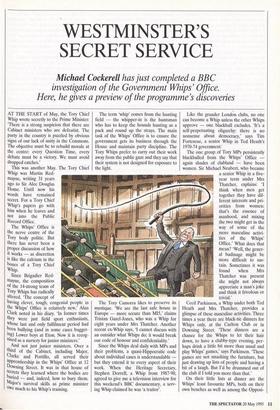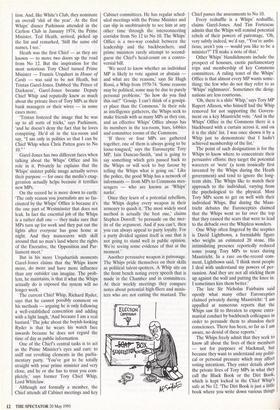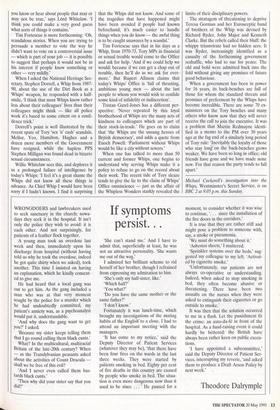WESTMINSTER'S SECRET SERVICE
Michael Cockerell has just completed a BBC
investigation of the Government Whips' Office.
Here, he gives a preview of the programme's discoveries
AT THE START of May, the Tory Chief Whip wrote secretly to the Prime Minister: `There is a strong suspicion that there are Cabinet ministers who are defeatist. The party in the country is puzzled by obvious signs of our lack of unity in the Commons. The objective must be to rebuild morale at the centre: every Question Time, every debate must be a victory. We must avoid dropped catches.'
This was another May. The Tory Chief Whip was Martin Red- mayne, writing 31 years ago to Sir Alec Douglas Home. Until now his words have remained secret. For a Tory Chief Whip's papers go with him when he leaves and not into the Public Record Office.
The Whips' Office is the nerve centre of the Tory body politic. But there has never been a proper discussion of how it works — as discretion is like the calcium in the bones of a Tory Chief Whip.
Since Brigadier Red- rnayne, the composition of the 14-strong team of Tory Whips has radically altered. 'The concept of having clever, tough, congenial people in the Whips' Office is relatively new,' Alan Clark noted in his diary. 'In former times they were just field sport enthusiasts, Whose last and only fulfilment period had been bullying (and in some cases bugger- 198) Lower boys at Eton. Now it is recog- nised as a nursery for junior ministers.' And not just junior ministers. Over a third of the Cabinet, including Major, Clarke and Portillo, all served their apprenticeship in the Whips' Office at 12 Downing Street. It was in that house of secrets they learned where the bodies are buried — and, indeed, how to bury them. Major's survival skills as prime minister owe much to his Whip's training. The term 'whip' comes from the hunting field — the whipper-in is the huntsman who has to keep the hounds hunting as a pack and round up the strays. The main task of the Whips' Office is to ensure the government gets its business through the House and maintain party discipline. The Tory Whips prefer to carry out their work away from the public gaze and they say that their system is not designed for exposure to the light.
The Tory Camorra likes to preserve its mystique. 'We are the last safe house in Europe — more secure than MI5,' claims Tristan Garel-Jones, who was a Whip for eight years under Mrs Thatcher. Another recent ex-Whip says, 'I cannot discuss with an outsider what Whips do; it would break our code of honour and confidentiality.'
Since the Whips deal daily with MPs and their problems, a quasi-Hippocratic code about individual cases is understandable but they extend it to every aspect of their work. When the Heritage Secretary, Stephen Dorrell, a Whip from 1987-90, agreed to give me a television interview for this weekend's BBC documentary, a serv- ing Whip claimed he was 'a traitor'. Like the grander London clubs, no ohe can become a Whip unless the other Whips approve — one blackball excludes. 'It's a self-perpetuating oligarchy: there is no nonsense about democracy,' says Tim Fortescue, a senior Whip in Ted Heath's 1970-74 government: The one group of Tory MPs persistently blackballed from the Whips' Office again shades of clubland — have been women. Sir Michael Neubert, who became a senior Whip in a five- year term under Mrs Thatcher, explains: 'I think when men get together they have dif- ferent interests and pri- orities from women: that's the essence of manhood, and mixing the two might get in the way of some of the more masculine activi- ties of the Whips' Office.' What does that mean? 'Well, the gener- al badinage might be more difficult to sus- tain. Sometimes it was found when Mrs Thatcher was present she might not always appreciate a man's joke and think it frivolous or trivial.'
Cecil Parkinson, a Whip under both Ted Heath and Mrs Thatcher, provides a glimpse of these masculine activities. Three times a year there are black-tie dinners for Whips only, at the Carlton Club or in Downing Street. 'These dinners are a chance for the Whips to let their hair down, to have a clubby-type evening, per- haps drink a little bit more than usual and play Whips' games,' says Parkinson. 'These games are not smashing the furniture, but just drawing up lists of people and having a bit of a laugh. But I'd be drummed out of the club if I told you more than that.'
On their little lists at dinner are the Whips' least favourite MPs, both on their own benches as well as among the Opposi- tion. And, like White's Club, they nominate an overall 'shit of the year'. At the first Whips' dinner Parkinson attended in the Carlton Club in January 1974, the Prime Minister, Ted Heath, arrived, picked up the list and remarked, 'Still the same old names, I see.'
Heath was the first Chief — as they are known — to move two doors up the road from No 12. But the inspiration for the most notorious Tory Chief turned Prime Minister — Francis Urquhart in House of Cards — was said to be not Heath, but Tristan Garel-Jones. Dubbed 'the Prince of Darkness', Garel-Jones became Deputy Chief Whip and reputedly knew as much about the private lives of Tory MPs as their bank managers or their wives — in some cases more.
`Tristan fostered the image that he was up to all sorts of tricks,' says Parkinson, `and he doesn't deny the fact that he loves conspiring. He'd sit in the tea-room and say, "I am only in politics so that I can be Chief Whip when Chris Patten goes to No 10."' Garel-Jones has two different faces when talking about the Whips' Office and his role in it. Privately he explains that the Whips' sinister public image actually serves their purpose — for once the media's exag- geration actually helps because it terrifies new MPs.
On the record he is more down to earth: `The only reason you journalists are so fas- cinated by the Whips' Office is because it's the one part of Westminster that does not leak. In fact the essential job of the Whips is a rather dull one — they make sure that MPs turn up for work and they put out the lights after everyone has gone home at night. And they manoeuvre with skill around that no man's land where the rights of the Executive, the Opposition and Par- liament meet.'
But in his more Urquhartish moments Garel-Jones claims that the Whips know more, do more and have more influence than any outsider can imagine. The prob- lem, he maintains, is that if what the Whips actually do is exposed the system will no longer work.
The current Chief Whip, Richard Ryder, says that he cannot possibly comment on his methods — arguing he is only following a well-established convention and adding with a light laugh, 'And because I am a real bastard.' The joke about the boyish-looking Ryder is that he wears his watch face inwards because he does not regard the time of day as public information.
One of the Chief's central tasks is to act as the Prime Minister's eyes and ears: to sniff out revolting elements in the parlia- mentary party. 'You've got to be totally straight with your prime minister and very close, and he or she has to trust you com- pletely,' says former Tory Chief Whip, Lord Whitelaw.
Although not formally a member, the Chief attends all Cabinet meetings and key Cabinet committees. He has regular sched- uled meetings with the Prime Minister and can slip in unobtrusively to see him at any other time through the interconnecting corridor from No 12 to No 10. The Whips' Office is a two-way conduit between the leadership and the backbenchers, and prime ministers rarely attempt to second- guess the Chief's head-count on a contro- versial bill.
`We need to know whether an individual MP is likely to vote against or abstain and what are the reasons,' says Sir Hugh Rossi, a Whip from 1970-74. 'Some reasons may be political, some may be due to purely personal problems.' So how do you find this out?"Gossip. I can't think of a gossipi- er place than the Commons.' In their role as intelligence gatherers, the Whips seek to make friends with as many MPs as they can, and an effective Whips' Office always has its members in the tea-room, bars, lobbies and committee rooms of the Commons.
`If three or four MPs are gathered together, one of them is always going to be loose-tongued,' says the Eurosceptic Tory MP, Iain Duncan-Smith, 'and is going to say something which gets passed back to the Whips or will seek to buy favour by telling the Whips what is going on.' Like the police, the good Whip has a network of informants — from MPs to Commons mes- sengers — who are known as 'Whips' narks'.
Once they learn of a potential rebellion, the Whips deploy every weapon in their armoury to quash it. 'The most widely used method is actually the best one,' claims Stephen Dorrell: `to persuade on the mer- its of the argument. And if you can't, then you can always appeal to party loyalty. For a party divided against itself is one that is not going to stand well in public opinion. We're seeing some evidence of that at the moment.'
Another persuasive weapon is patronage. The Whips pride themselves on their skills as political talent-spotters. A Whip sits on the front bench noting every speech that is made in the Chamber and in committees. At their weekly meetings they compare notes about potential high-fliers and minis- ters who are not cutting the mustard. The Chief passes the assessments to No 10.
Every reshuffle is a Whips' reshuffle, claims Garel-Jones. And Tim Fortescue admits that the Whips will remind potential rebels of their powers of patronage, 'Oh, very subtly indeed, we'd say, "You're ambi- tious, aren't you — would you like to be a minister?" I'll make a note of that.'
Other Whips' blandishments include the prospect of honours, exotic parliamentary trips and membership of key Commons committees. A ruling tenet of the Whips' Office is that almost every MP wants some- thing; the few who do not they refer to as `Whips' nightmares'. Sometimes the desig- nations are less courteous.
`Oh, there is a shits' Whip,' says Tory MP Rupert Allason, who himself had the Whip removed for not supporting the Govern- ment on a key Maastricht vote. 'And in the Whips' Office in the Commons there is a blackboard with a curtain across it, and on it is the shits' list. I was once shown it by a Whip just to demonstrate that I hadn't achieved membership of the list.'
The point of such designations is for the Whips to know where to concentrate their persuasive efforts: they target the potential waverers or 'wets' (a term ironically first invented by the Whips during the Heath government) and tend to ignore the long- term shits. The Whips like to match their approach to the individual, varying from the psychological to the physical. Most Tory MPs seem to get on well with their individual Whips. But during the Maas- tricht debates the Eurosceptics claimed that the Whips went so far over the top that they caused the scars that were to lead to the debacle over the Whipless wonders.
One Whip often fingered by the sceptics is David Lightbown, a formidable figure who weighs an estimated 20 stone. His intimidating presence reportedly reduced some young Tory MPs to tears during Maastricht. In a rare on-the-record com- ment, Lightbown said, 'I think most people I deal with understand my powers of per- suasion. And they are not all sticking them up against the wall and putting the knee in. I sometimes kiss them better.'
The late Sir Nicholas Fairbairn said openly what many other Eurosceptics claimed privately during Maastricht: 'I am appalled at numerous reports that the Whips saw fit to threaten to expose extra- marital conduct by backbench colleagues in order to persuade them to abandon their consciences. There has been, so far as I am aware, no denial of these reports.'
The Whips freely admit that they seek to know all about the lives of their members — not for purposes of blackmail, but because they want to understand any politi- cal or personal pressure which may affect voting intentions. They enter details about the private lives of Tory MPs in what they call the Black Book or the Dirt Book, which is kept locked in the Chief Whip's safe at No 12. 'The Dirt Book is just a little book where you write down various things you know or hear about people that may or may not be true,' says Lord Whitelaw. 'I think you could make a very good guess what sorts of things it contains.'
Tim Fortescue is more forthcoming: 'Oh, scandalous stories. When you are trying to persuade a member to vote the way he didn't want to vote on a controversial issue — which is part of your job — it is possible to suggest that perhaps it would not be in his interest if people knew something or other -very mildly.'
When I asked the National Heritage Sec- retary, Stephen Dorrell, a Whip from 1987- 90, about the use of the Dirt Book as a Whips' weapon, he responded with a half- smile, 'I think that most Whips know rather less about their colleagues' lives than their colleagues might think — like all police work it's based to some extent on a confi- dence trick.'
Dorrell's point is well illustrated by the recent spate of Tory 'sex 'n' cash' scandals. Mellor, Yeo, Hamilton, Hughes and a dozen more members of the Government have resigned, while the hapless PPS Stephen Milligan was found dead in bizarte sexual circumstances.
Willie Whitelaw sees this, and deplores it as a prolonged failure of intelligence by today's Whips: 'I feel it's a great shame the Whips did not know all these things in advance. As Chief Whip I would have been sorry if i hadn't known. I find it surprising that the Whips did not know. And some of the tragedies that have happened might have been avoided if people had known beforehand; it's much easier to handle things when you do know — the awful thing is to be caught unawares by a scandal.'
Tim Fortescue says that in his days as a Whip, from 1970-73, Tory MPs in financial or sexual trouble would come to the Office and ask for help. 'And if we could help we would; because if we can get a chap out of trouble, then he'll do as we ask for ever- more.' But Rupert Allason claims that today's Whips' Office is 'full of thrusting, ambitious young men — about the last people to whom you would wish to confide some kind of infidelity or indiscretion'.
Tristan Garel-Jones has a different per- spective: 'Never repeated by this loyal brotherhood of Whips are the many acts of kindness to colleagues which are part of their stock-in-trade.' He goes on to claim that 'the Whips are the unsung heroes of British democracy', and adds a quote from Enoch Powell: 'Parliament without Whips would be like a city without sewers.'
When one has talked to more than 50 current and former Whips, one begins to understand why serving Whips make it a policy to refuse to go on the record about their work. The recent tide of Tory sleaze tends to give the lie to the claim of Whips' Office omniscience just as the affair of the Whipless Wonders starkly revealed the limits of their disciplinary powers.
The stratagem of threatening to deprive Teresa Gorman and her Eurosceptic band of brothers, of the Whip was devised by Richard Ryder, John Major and Kenneth Clarke. But the rebels called their bluff: the whippy triumvirate had no hidden aces. It was Ryder, increasingly identified as a casualty of the forthcoming government reshuffle, who had to sue for peace. The old and bold were admitted back into the fold without giving any promises of future good behaviour.
When a government has been in power for 16 years, its back-benches are full of those for whom the standard threats and promises of preferment by the Whips have become incredible. There are some 70 ex- ministers on the Tory benches and many others who know now that they will never receive the call to join the executive. It was a problem that Martin Redmayne identi- fied in a memo to the PM over 30 years ago at the fag end of a similarly long period of Tory rule: 'Inevitably the loyalty of those who stay ion? on the back-benches grows weaker. We have been so long in office; old friends have gone and we have made none new. For that reason the party tends to fall apart.'
Michael Cockerell's investigation into the Whips, Westminster's Secret Service, is on BBC 2 at 9.05 p.m. this Sunday.




































































 Previous page
Previous page